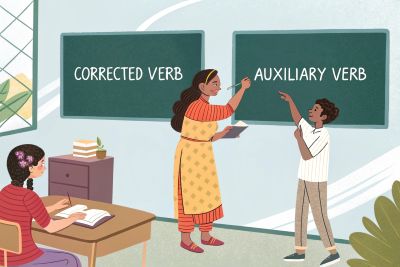Verb vs Auxiliary যেখানে ভুল হয় ঠিক করবেন কিভাবে: মূল ক্রিয়া (principal verb) এবং সহায়ক ক্রিয়া (auxiliary verb) এর পার্থক্য ও ব্যবহার ভালোভাবে বুঝতে হলেপ্রতিটি ক্রিয়ারয়ার সংজ্ঞা ও কাজ বুঝুন। মূল ক্রিয়া বাক্যে প্রধান অর্থ বহন করে এবং সহায়ক ক্রিয়াও voice-এ voice Voice নির্দিষ্টসাহায্য করে। একটি বাক্যে কখন কোন ধরনের ক্রিয়া ব্যবহার করতে হবে, তা নির্ভর করে সেই বাক্যের উদ্দেশ্য (যেমন: প্রশ্ন করা, নেতিবাচক করা, বা কোনো কাজ সম্পন্ন করা) এবং মূল ক্রিয়ার অবস্থার উপর।
Verb Vs Auxiliary Verb: Common Mistakes and How to Correct Them
ইংরেজি শেখা সম্ভব, কিন্তু এটি চ্যালেঞ্জিংও হতে পারে। নতুন শিক্ষার্থীদের জন্য সবচেয়ে বড় অসুবিধাগুলির মধ্যে একটি হল ক্রিয়া এবং সহায়ক ক্রিয়া কীভাবে একসাথে কাজ করে তা বোঝা। অনেক শিক্ষার্থী কিছু শব্দভাণ্ডার জানে, কিন্তু যখন সঠিক বাক্য গঠনের কথা আসে, তখন তারা প্রায়শই প্রধান ক্রিয়া (principal verb) এবং সহায়ক ক্রিয়া (auxiliary verb) এর মধ্যে বিভ্রান্তির কারণে ভুল করে।
যদি আপনার প্রায়শই “She sings a song” অথবাor “They play football,” এর মতো বাক্যগুলির সাথে সমস্যা হয়, তাহলে চিন্তা করবেন না, আপনি একা নন! এই প্রবন্ধে, আমরা ক্রিয়াপদ (principal verb) এবং (auxiliary verb) সহায়ক ক্রিয়াপদের মধ্যে পার্থক্য অন্বেষণ করব, শিক্ষার্থীদের করা সাধারণ ভুলগুলি দেখব এবং স্পষ্ট নিয়ম এবং উদাহরণ দিয়ে কীভাবে সেগুলি ঠিক করতে হয় তা শিখব।
1.What is a verb?
A verb is the action word in a sentence. It tells us what the subject is doing. Without verbs, you cannot make meaningful sentences.
Example of Verbs
| Main Verb | Verb Example | Explanation |
|---|---|---|
| Run | She runs fast | Auxiliary নয় → “run” কখনো helping verb হয় না। |
| Eat | They eat rice | Auxiliary নয় → “eat” কখনো helping verb হয় না। |
| Go | I go to school | Auxiliary নয় → “go” কখনো helping verb হয় না। |
| Play | Children play football | Auxiliary নয় → “play” কখনো helping verb হয় না। |
| Write | She writes a letter | Auxiliary নয় → “write” কখনো helping verb হয় না। |
| Sleep | The baby sleeps | Auxiliary নয় → “sleep” কখনো helping verb হয় না। |
| Speak | We speak English | Auxiliary নয় → “speak” কখনো helping verb হয় না। |
| Drink | He drinks water | Auxiliary নয় → “drink” কখনো helping verb হয় না। |
| Sing | She sings beautiful | Auxiliary নয় → “sing” কখনো helping verb হয় না। |
| Jump | The cat jumps high | Auxiliary নয় → “jump” কখনো helping verb হয় না। |
| Look | They look at the stars | Auxiliary নয় → “look” কখনো helping verb হয় না। |
| Read | He reads a story | Auxiliary নয় → “read” কখনো helping verb হয় না। |
| Cook | My mother cooks food | Auxiliary নয় → “cook” কখনো helping verb হয় না। |
| Drive | He drives a car | Auxiliary নয় → “drive” কখনো helping verb হয় না। |
| Study | I study every day | Auxiliary নয় → “study” কখনো helping verb হয় না। |
So, the verb is the heart of the sentence.
Read More: Female education

2. What is the auxiliary verb?
An auxiliary verb (also called a helping verb) is used together with the main verb to show tense, mood, or voice. It “helps” the main verb make complete sense.
| Auxiliary Verb | Example | Meaningful |
|---|---|---|
| Be verb | ||
| Am | I am reading a book | (am=auxiliary verb, reading= main verb) |
| Is | She is singing a song | (is=auxiliary verb, singing= main verb) |
| Are | They are playing football | (are= auxiliary verb, playing= main verb) |
| Was | He was watching TV | (was= auxiliary verb, watching= main verb) |
| Were | We were studying last night | ( were= auxiliary verb, studying= main verb) |
| Have verb | ||
| Have | I have eaten lunch | (have= auxiliary verb, eaten= main verb) |
| Has | She has finished her homework | (finished= auxiliary verb, finished= main verb) |
| Had | They had gone before I arrived | (had= auxiliary verb, arrived= main verb) |
| Do verb | ||
| Do | I do not like cold drinks | (do= auxiliary verb, drink= main verb) |
| Does | He does not play cricket | (does= auxiliary verb, play= main verb) |
| Did | We did not see the movie | (did= auxiliary verb, see= main verb) |
| Modal Auxiliary Verb | ||
| Can | She can swim well | (can= auxiliary verb, swim= main verb) |
| Could | I could help you | (could= auxiliary verb, help= main verb) |
| May | You may go now | may= auxiliary verb (permission), go= main verb ( action) |
| Might | It might rain today | (might= auxiliary verb, rain= main verb) |
| Shall | We shall meet again | (shall= auxiliary verb, meet= main verb) |
| Should | You should study more | (should= auxiliary verb, study= main verb) |
| Will | I will call you tomorrow | (will= auxiliary verb, call= main verb) |
| Would | He would come if he could | (would= auxiliary verb, come= main verb) |
| Must | We must follow the rules | (must =auxiliary verb) |
“এভাবে প্রতিটি auxiliary verb-এর সাথে একটি main verb বসাতে হয়। Auxiliary verb আলাদা কোনো action দেখায় না বরং main verb-এর অর্থ সম্পূর্ণ বা পরিপূর্ণ করে।”

















